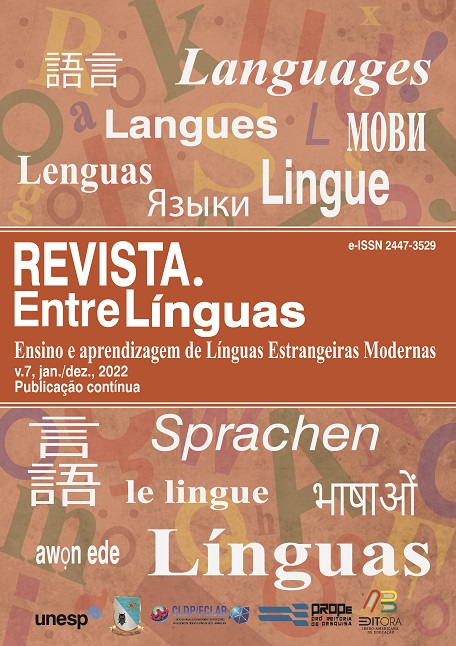Author's idiostyle, linguistic and translation aspects
DOI :
https://doi.org/10.29051/el.v8i00.16660Mots-clés :
idiostyle, comparison, metaphor, author's style, LingüísticaRésumé
The problem of individual author's Stylistics, its place in the system of already functioning verbal means and its role in realizing the unique pragmatic potential of a literary work and the author as a whole have become the basis for numerous studies in the field of linguostylistics, which indicates the relevance of this work. The purpose of the article is to study the linguistic and translation aspects of the author's idiostyle. Methods. The paper used scientific methods: generalization, systematization and classification of methodological sources and scientific approaches to the study of the concept of “idiostyle” in the system of linguistic analysis of literary texts in scientific works of Ukrainian and foreign researchers. Results. The semantic difference between the studied comparisons and metaphors revealed some semantic value of these tropes and their functions in establishing genre features of Stephen King's idiostyle. Conclusion. Structural differentiation of comparisons and metaphors allowed us to analyze the frequency of their use in the author's works. The most common type is a group of binomial nominative comparisons, while other groups have approximately the same number of examples. Among metaphors, the most widely used type is a simple metaphor with a single image. The analysis of the translation aspect of S. King's works shows that each author uses his own approaches in translating lexical and stylistic means aimed at implementing a strategy to create a certain atmosphere. But it should be noted that the most effective is the use of lexical and stylistic means close to the original, while omission, transliteration and often contextual substitution in translation reduce the effectiveness of creating certain emotions in the reader. The basis for further research is to determine approaches to the study of the author's idiostyle in the dramatic genre.
Téléchargements
Références
ARGAMON, Shlomo; KOPPEL, Moshe. A systemic functional approach to automated authorship analysis. JL & Pol'y, vol. 21, no.(2), p. 299–316, 2012.
BABICH, V. I. Linguostylistic means of expressing the lyrical self at the lexical and grammatical level in a poetic text (based on the materials of idiodiscourses by R. Frost and J. R. R. Tolkien).K. Sandberg). Scientific Bulletin of Kherson State University, vol. 3, p. 109-116, 2017.
BARLOW, M. Individual differences and usage-based grammar. International Journal of Corpus Linguistics, 18(4), 443–478. 2013
CRYSTAL, David. The gift of the gab: How eloquence works. Yale University Press, 2016. 243 p.
EDER, Maciej. Does size matter? Authorship attribution, small samples, big problem. Digital Scholarship in the Humanities, vol. 30, no. 2, p. 167-182, 14 Nov. 2013. Available from: https://doi.org/10.1093/llc/fqt066. Accessed: 7 Apr. 2022.
EDWARDS R. Robert Louis Stevenson on Style in Literature. Classic Articles on Writing, 2019.
ELIOT, Thomas Stearns. Tradition and the Individual Talent. The Sacred Wood. Retrieved. 2015. Available from: http://www.bartleby.com/200/sw4.html 326 Accessed: 7 Apr. 2022.
JOHNSON, Alison; WRIGHT, David. Identifying idiolect in forensic authorship attribution: an n-gram textbite approach. Language and Law (Linguagem e Direito) vol. 1(1), p. 37-69, 2014
KING, Stephen. Carrie. New York, Simon and Schuster, 2000. 208 p.
KING, Stephen. Dreamcatcher. London, Hodder and Stoughton, 2001. 385 p.
KING, Stephen. Everything’s Eventual. Hachette UK, London, 2007 pp. 365-403.
KING, Stephen. The Dead Zone. New York, Simon and Schuster, 2016. 592 p.
KING, Stephen. The Shining. London, Hodder and Stoughton, 2006. 497 p.
LARNER, Samuel. A preliminary investigation into the use of fixed formulaic sequences as a marker of authorship. International Journal of Speech Language and the Law, vol. 21, no. 1, 26 June 2014. Available from: https://doi.org/10.1558/ijsll.v21i1.1. Accessed: 7 Apr. 2022.
AMANN, Janek. Authorship Attribution in Fan-Fictional Texts given variable length Character and Word N-Grams. 2019.
MUTTENTHALER, Lukas; LUCAS, Gordon & AMANN, Janek. Authorship Attribution in Fan-Fictional Texts Given Variable Length Character and Word N-Grams. Notebook for PAN at CLEF 2019, 2019. Available from: http://ceur-ws.org/Vol-2380/paper_49.pdf Accessed: 7 Apr. 2022.
SCHMID, Hans-Jörg. A framework for understanding linguistic entrenchment and its psychological foundations. Entrenchment and the Psychology of Language Learning: How We Reorganize and Adapt Linguistic Knowledge (pp.9–36). Berlin: De Gruyter Mouton, 2016
SHEVKUN, A. Problematic aspects of rendering the author’s idiostyle in the process of translation (based on the novel by I. McEwan “Atonement” and its Ukrainian and Russian translations). International Humanitarian University Herald. Philology, vol. 41, no. 2, p. 182-186, 2019. Available from: https://doi.org/10.32841/2409-1154.2019.41.2.44. Accessed: 7 Apr. 2022.
WRIGHT, David. Using word n-grams to identify authors and idiolects. International Journal of Corpus Linguistics, vol. 22, no. 2, p. 212-241, 22 Sept. 2017. Available from: https://doi.org/10.1075/ijcl.22.2.03wri. Accessed: 7 Apr. 2022.
TYMIAKIN, Leszek. O sztuce reportażu: Aneta Wysocka, Fakty – język – podmiotowość. Stylistyczne osobliwości reportaży Ryszarda Kapuścińskiego, Lublin: Wydawnictwo Uniwersytetu Marii Curie-Skłodowskiej, 2016, 278 s. Etnolingwistyka. Problemy Języka i Kultury, vol. 30, p. 346, 17 Aug. 2018. Available from: https://doi.org/10.17951/et.2018.0.346. Accessed: 7 Apr. 2022.
Téléchargements
Publiée
Comment citer
Numéro
Rubrique
Licence

Ce travail est disponible sous licence Creative Commons Attribution - Pas d’Utilisation Commerciale - Partage dans les Mêmes Conditions 4.0 International.
Os manuscritos aceitos e publicados são de propriedade da Revista EntreLínguas. Os artigos publicados e as referências citadas na Revista EntreLínguas são de inteira responsabilidade de seus autores.
Transferência de direitos autorais – autorização para publicação
Caso o artigo submetido seja aprovado para publicação, já fica acordado que o(s) autor(es) autoriza(m) a UNESP a reproduzi-lo e publicá-lo na EntreLínguas, entendendo-se os termos “reprodução” e “publicação” conforme definição respectivamente dos incisos VI e I do artigo 5° da Lei 9610/98. O artigo poderá ser acessado pela rede mundial de computadores (Internet), sendo permitidas, a título gratuito, a consulta e a reprodução de exemplar do artigo para uso próprio de quem a consulta, desde que haja a citação ao texto consultado. Essa autorização de publicação 328 EntreLínguas, Araraquara, v. 1, n .2, p. 323-328, jul./dez. 2015 não tem limitação de tempo, ficando a UNESP responsável pela manutenção da identificação do(s) autor(es) do artigo. Os artigos publicados e as referências citadas na Revista EntreLínguas são de inteira responsabilidade de seus autores.











